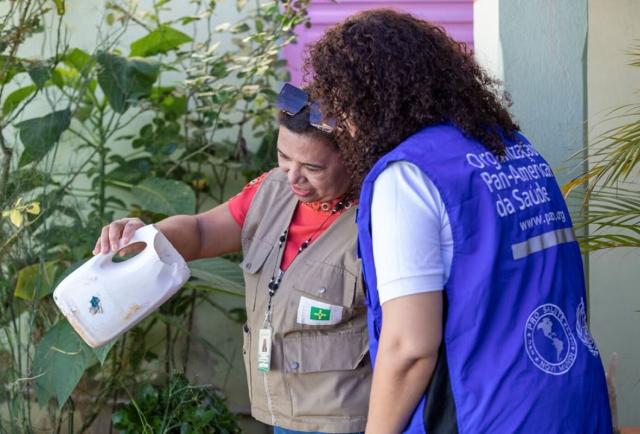Table of Contents
- 1 Countries that are flagged for possible risk of virus contagion
- 2 What is oropouche?
- 3 **In light of the potential economic and social impacts of travel restrictions and advisories, how can PAHO promote a balanced approach that prioritizes both public health and the livelihoods of communities dependent on tourism in affected regions?**
The British health organization Travel Health Pro has asked travelers to take extra precautions in those countries
Travel Health Pro, a UK body, has issued alerts for travelers to take extra precautions if they plan to visit countries in Africa, Central America or South Americadue to possible outbreaks of viral strains.
The diseases that have been reported by Travel Health Pro, attached to the National Travel Health Network and Center (NaTHNaC) are: marburg, mpox and oropouche, viruses that are potentially deadly.
(You may be interested: Oropouche outbreak puts Latin America on alert)
“Marburg virus disease outbreak reported in Rwanda“said the British entity, whose function is to alert travelers from the United Kingdom about the risks of pathologies in their destination countries.
“Also Outbreaks of mpox clade I and oropouche are ongoing in several countries. Stay up to date with these links if you travel to affected areas,” Travel Health Pro stated on its web portal.
Lack of payments threatens the operation of dialyzers
Read more
Countries that are flagged for possible risk of virus contagion
In addition to the Marburg virus, in Rwanda, the British institution has pointed out other countries for possible risk of contagion of other illnesses. In the case of the oropouche, Ecuador and other nations in the region such as Bolivia, Brazil, Colombia are cited.Cuba, Dominican Republic, Guyana, Panama and Peru.
For the mpox virus, the countries are Burundi, Congo, Democratic Republic of the CongoCentral African Republic, Gabon, Kenya, Rwanda and Uganda.
What is oropouche?
According to the Pan American Health Organization (PAHO), oropouche is a viral disease characterized by high fever, severe headachephotophobia, joint and muscle pain, the healing period of which takes between 2 and 3 weeks.
Nevertheless, In complicated cases, encephalitis or meningitis may occur.. “Currently, there are no vaccines or specific antiviral treatments, and management focuses on symptomatic relief,” the organization states on its website.
(Also read: Africa registers more than 32,400 cases and 840 deaths from mpox so far in 2024)
PAHO indicated that, Between January and October 2024, 10,275 cases of oropouche have been reported in nine Latin American countries.. Brazil leads the list, with 8,258 cases, including two deaths.
Cases of this pathology have also been recorded in Ecuador, Bolivia, Cuba, Colombia, Guyana and Peru.. The United States and Canada have reported 92 imported cases related to travel to transmission countries.
Do you want to continue reading the content of EXPRESO? SUBSCRIBE HERE!
## World Today News Interview: Viral Outbreaks
**Introduction**
Welcome to World Today News. Today, we’re discussing alarming reports from Travel Health Pro, a UK health organization, urging travelers to exercise extra caution when visiting specific regions due to potential outbreaks of deadly viruses.
Joining us today are Dr. Emily Carter, an infectious disease specialist, and Thomas Lee, a travel journalist specializing in Latin America. Welcome both of you.
**Section 1: Understanding the Threats**
* **Dr. Carter:** The article mentions Marburg, mpox, and oropouche viruses. Could you briefly explain each virus’s key characteristics and potential severity?
* **Thomas:** The article highlights countries in Africa, Central, and South America as areas of concern. Can you shed light on why these regions might be particularly vulnerable to these outbreaks? What are some contributing factors?
**Section 2: Traveler Precautions and Responsibility**
* **Dr. Carter:** Travel Health Pro emphasizes travelers taking extra precautions. What specific steps can individuals take to minimize their risk of infection while traveling to these regions?
* **Thomas:** How can travelers effectively stay informed about the latest developments and health advisories for their destinations? What resources are available to help them make informed decisions about their travel plans?
* **Dr. Carter:** Beyond personal safety, how can travelers contribute to preventing the further spread of these viruses? What role does responsible tourism play in this context?
**Section 3: Responding to Outbreaks and Future Perspectives**
* **Thomas:** The World Health Organization has emphasized the importance of international cooperation in controlling these outbreaks. Can you elaborate on the specific steps needed to effectively address these challenges on a global scale?
* **Dr. Carter:** What advancements are being made in vaccine development and treatment options for these viruses? What are the long-term strategies for managing and preventing future outbreaks?
**Section 4: A Wider Discussion**
* **Thomas:** These outbreaks highlight the interconnectedness of global health. How can we learn from these experiences to improve global preparedness and response to emerging infectious diseases?
* **Dr. Carter:** In your opinion, what are the biggest challenges and opportunities in the field of global health security today?
**Ending**
Thank you, Dr. Carter and Thomas, for sharing your valuable insights. We hope this discussion has raised awareness about these important health concerns while providing viewers with practical information.
For more details on travel advisories and health recommendations, viewers can visit the Travel Health Pro website and the Pan American Health Organization’s website.


